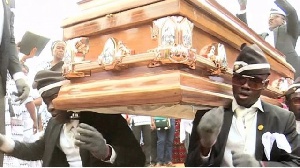The funeral industry is the largest locally, surpassing the “Jesus Industry” in both urban and rural areas, and has tremendous impact on many others. It is the greatest contributor to local tourism but unfortunately leads to a greater proportion of deaths and disability from road traffic accidents. Most accidents in Ghana occur on Saturday evenings between 5 and 8 p.m. when people are on their way from funerals usually under the influence of alcohol, a key ingredient in the funeral mix.
Ghana's disease burden is very high with deaths from communicable diseases, infections and infestations, and non-communicable diseases such as stroke, hypertension, diabetes and cancers straddling all age groups from the very young with underlying malnutrition in today's Ghana, to the very old. Many die before the retirement age of 60 which must be a big bother to life insurance and pensions companies but suffice to say they may be content with the two percent penetration and do not contribute to the healthcare industry to ensure most persons live to the ripe old age and contribute fully to their life insurance policies and pensions. It is worrying that using the population of the dead that are autopsied in Ghana, 80 per cent are before their sixtieth birthday compared to 19 per cent in the United Kingdom. There is, therefore, no shortage of funerals throughout the country.
The Akans observe seven days when it is believed the soul starts the journey to the next world and therefore ancestors must be informed through drums. It, therefore, means that in most towns and villages of the Akan world there will be movements for the one week observation. Most other ethnic groupings have similar arrangements before the funeral.
Ramifications
As soon as death is announced, the body must be moved to hospital for certification of death by a doctor if it was not in hospital, before being sent to the mortuary. There has been a proliferation of mortuaries everywhere without the full implementation of the Mortuaries and Funeral Homes Board in Ghana, some doing a reasonable job and others not so much. Postmortems are done depending on the situation and the body is embalmed. Medical cause of death certificate is obtained, registered with the Death and Births Registry and a burial permit granted. The week’s event involve posters, traditional music, spinners, canopies and chair hiring, drinks, schnapps, local spirit, palm wine, pito or ahey, beers, Guinness and soft drinks and water. Commiserations to the bereaved family also come with drinks, water and cash contributions towards the funeral. The day for the funeral is fixed in consultation with family members and church and then the task begins. In most communities, visitors buy farm gate produce cheaper and fresh.
Printers are contacted for the printing of posters, stickers and brochures. Undertakers are chosen for the work on the body and the lying in state. Coffins are selected or carpenters are tasked to produce them. Funeral homes such as Lashibi and Transitions offer a one-stop shop. Hearses are arranged for the journeys with the attendant pall bearers. Depending on where the deceased worked, welfare buses and the mourning brigade are lined up for the travels. Transport companies get busy over weekends, Fridays, Saturdays and Sundays. Many Ghanaians have used these opportunities to visit many parts of the country but there are others who have not moved even five kilometers beyond their natural confines.
The journey involves stoppages at favourite chop bars along the way. Caterers are engaged locally or imported to provide for visitors. Chillers are hired, ice bought for the drinks and water. Local hotels and guesthouses are booked well in advance and alternate local arrangements are made. Local transport is secured for church members and choristers to go to the cemetery.
On the day, the body lies in state amidst wailing from family, close relations and in some cases professional wailers, traditional drumming and dancing, pouring of libation and the exhibition of send off gifts. The body is then conveyed to church or the ceremony is held in a hired park or community centre or for atheist or traditional religion practitioners, in the house prior to burial.
Once a burial permit is obtained, the District Assembly will grant a burial site where the grave is dug, cemented and tiled depending on the social status of the dead. Private burial sites as in Getsemane Gardens and Lashibi provides for the highend. At the grave site, the necessary traditions are performed first by the church and then the family prior to burial.
Food and drinks are provided for visitors, family and friends before the funeral ceremony where funeral donations and pacifying gifts from the in laws are received including drinks, handkerchiefs and sheep. After the funeral ceremony, there are those who organise buffet dinners on Saturday night. Many who travel back buy fresh farm produce cheaper than you will get in most places.
These farmers make quite some money and look forward to the next funeral. Sundays start with church service followed by lunch and continuation of the funeral ceremony usually for the locals. Monday mornings, the family meets to check the accounts and settle any family issues.
Impact
Rural economies are dependent on funerals. Many grew up believing funerals were a waste of time but now realise there will be nothing for many to do in the rural communities without such activities. At least it brings long and lost family and friends back home and also provide sales avenues for farm gate produce.
Can anybody estimate the number of deaths in Ghana everyday? Since birth registration is about 70 per cent, death registration will be far less.
In most places the second half of the week is devoted to funeral activities. Wednesday is the day of preparation, burials are on Thursdays, Fridays or Saturdays. As for the impact on productivity in Ghana, development economists must put some sums together but it must be huge, three to five per cent of GDP perhaps.
How much money circulates in the funeral loop? It must be considerable.
Carpenters, grave diggers, masons and tilers, drivers and vehicle owners, funeral cloth manufacturers and sellers, and also seamstresses and tailors, undertakers, drinks and water makers and sellers, caterers, foodstuff and livestock farmers, in addition to traditional music groups and dancers, spinners, chair and canopy rentals, petrol and diesel sellers and many more are dependent on funerals.
In areas where funerals are held monthly, it may appear useful for the society as a whole and in particular the many who have to travel but for the rural economy it may be detrimental or does it even out eventually.
Ghana has become known for the way we treat our dead and carry ourselves over funerals even in our adopted countries. Non Ghanaians look at us so curiously particularly in the winter months when the men put on their cloths and wait for buses to take them to the funeral destination. The police also keep watch for those who drink and drive.
There must be a concerted effort to reduce the disease burden in Ghana and to reduce the proportion of deaths before the retirement age of 60 years. Life insurance and pension companies can assist since they stand to benefit ultimately. The National Insurance Commission and the National Pension Regulatory Authority can be of help in this regard and Ghana's productivity will also improve.
Opinions of Tuesday, 20 March 2018
Columnist: Prof. Agyeman Badu Akosa















